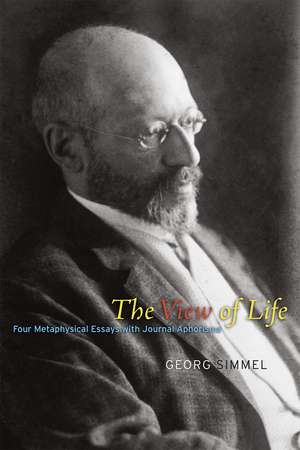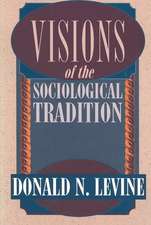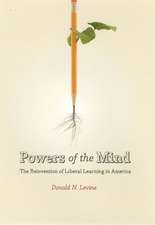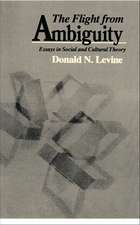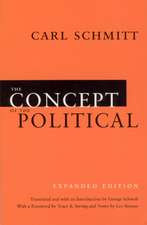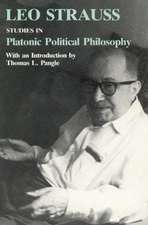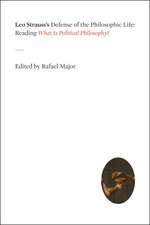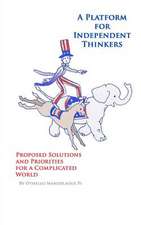The View of Life: Four Metaphysical Essays with Journal Aphorisms
Autor Georg Simmel Traducere de John A. Y. Andrews, Donald N. Levine Introducere de Daniel Silveren Limba Engleză Paperback – 3 iul 2015
Published in 1918, The View of Life is Georg Simmel’s final work. Famously deemed “the brightest man in Europe” by George Santayana, Simmel addressed diverse topics across his essayistic writings, which influenced scholars in aesthetics, epistemology, and sociology. Nevertheless, certain core issues emerged over the course of his career—the genesis, structure, and transcendence of social and cultural forms, and the nature and conditions of authentic individuality, including the role of mindfulness regarding mortality. Composed not long before his death, The View of Life was, Simmel wrote, his “testament,” a capstone work of profound metaphysical inquiry intended to formulate his conception of life in its entirety.
Now Anglophone readers can at last read in full the work that shaped the argument of Heidegger’s Being and Time and whose extraordinary impact on European intellectual life between the wars was extolled by Jürgen Habermas. Presented alongside these seminal essays are aphoristic fragments from Simmel’s last journal, providing a beguiling look into the mind of one of the twentieth century’s greatest thinkers.
Now Anglophone readers can at last read in full the work that shaped the argument of Heidegger’s Being and Time and whose extraordinary impact on European intellectual life between the wars was extolled by Jürgen Habermas. Presented alongside these seminal essays are aphoristic fragments from Simmel’s last journal, providing a beguiling look into the mind of one of the twentieth century’s greatest thinkers.
Preț: 211.30 lei
Nou
Puncte Express: 317
Preț estimativ în valută:
40.43€ • 42.22$ • 33.39£
40.43€ • 42.22$ • 33.39£
Carte tipărită la comandă
Livrare economică 16-30 aprilie
Preluare comenzi: 021 569.72.76
Specificații
ISBN-13: 9780226273303
ISBN-10: 022627330X
Pagini: 240
Ilustrații: 1 table
Dimensiuni: 152 x 229 x 20 mm
Greutate: 0.35 kg
Editura: University of Chicago Press
Colecția University of Chicago Press
ISBN-10: 022627330X
Pagini: 240
Ilustrații: 1 table
Dimensiuni: 152 x 229 x 20 mm
Greutate: 0.35 kg
Editura: University of Chicago Press
Colecția University of Chicago Press
Notă biografică
Georg Simmel (1858–1918) taught at the University of Berlin and, later, at the University of Strasbourg. His many books include The Philosophy of Money, On Social Differentiation, and Rembrandt: An Essay in the Philosophy of Art. John A. Y. Andrews is consultant to the Rhode Island Medicaid program. Donald N. Levine is the Peter B. Ritzma Professor Emeritus of Sociology at the University of Chicago and the author of, most recently, Powers of the Mind: The Reinvention of Liberal Learning in America.
Cuprins
Introduction
Note on the Translation
I. Life as Transcendence
II. The Turn toward Ideas
III. Death and Immortality
IV. The Law of the Individual
Appendix: Journal Aphorisms, with an Introduction
Notes from Simmel's "Metaphysics" File
Note on the Translation
I. Life as Transcendence
II. The Turn toward Ideas
III. Death and Immortality
IV. The Law of the Individual
Appendix: Journal Aphorisms, with an Introduction
Notes from Simmel's "Metaphysics" File
Recenzii
“Although Simmel has written the most profound and stimulating book in sociology, in my opinion, that has ever been written, he was not in the first instance a sociologist but a philosopher.”
“Following World War II, neither in Germany nor the United States did Simmel achieve an intellectual presence that would lead one to suspect the extent of the influence he exerted on his contemporaries.”
“Simmel is the only social theorist one can read anymore.”
“This volume would be worth purchasing for the aphorisms alone. . . . [The] cover photograph of Simmel, convincing me that faces convey their own truth, perfectly complements the text. Each of the four essays stands alone, yet consistency of concerns unifies them.”
“[A] wide-ranging intellectual meditation on ‘life’ in its most general aspects. The publication of an English-language edition of a major work authored by one of the central figures in social theory today constitutes an event, and this translation effort certainly qualifies as such. Levine’s exemplary introduction to the book does a fantastic job of dealing with the intellectual and more immediate ‘production’ history of the book. . . . [A] book like no other written by a classical social theorist.”
“Apart from providing the English-speaking reader with an excellent translation of The View of Life and an equally excellent introduction to this work, Levine et al. have also included a special treat for the reader. It can be found in the last 30 pages of the book called ‘Journal Aphorisms,’ which contains most of the aphorisms that Simmel wrote. . . . Each reader will find their own favorites in this delightful collection.”
“One feels Simmel as a person much more in this last work than in any other of his works. . . . In these essays, Simmel is present as an ‘I,’ and with this we finally see that Simmel’s brilliant sociology and philosophy was a direct reflection of his own experience with and consciousness of the world. It is hard to imagine the serious ongoing study of Simmel without reference to this superb translation of Simmel’s last work.”—Journal of Classical Sociology
